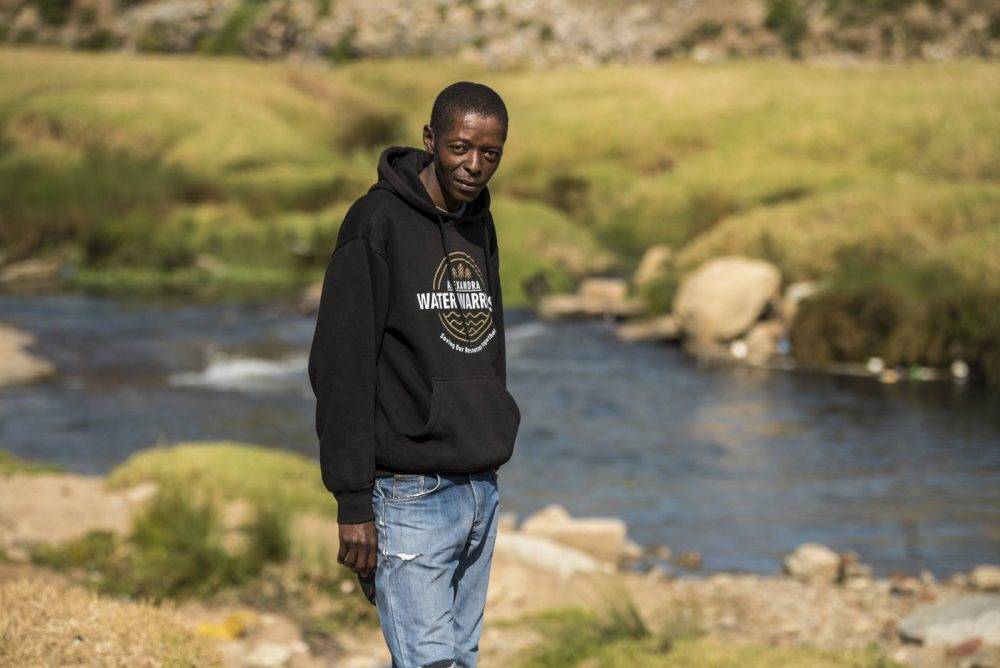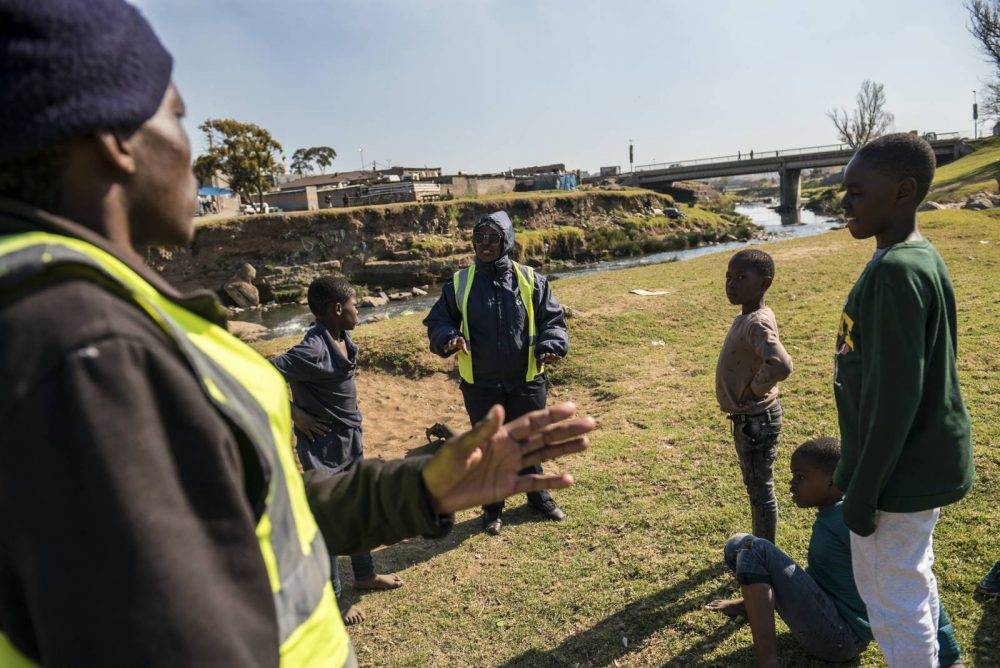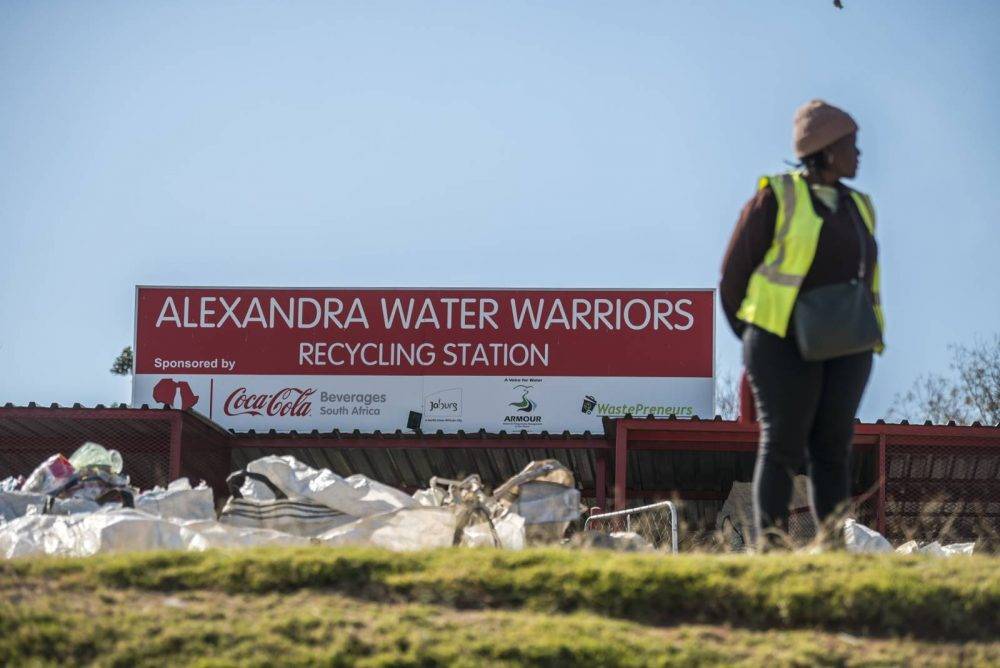The polluted, littered Jukskei River in Johannesburg. (Delwyn Verasamy/M&G)
The faint stench of sewage hangs over the polluted Jukskei River in Johannesburg’s Alexandra township. Paul Maluleke, scanning the grey water, knows what the source of the latest sewage spill is.
“There’s a sewer that’s blocked and is now diverted into the river,” said the founding member of the nonprofit Alexandra Water Warriors.
“We’ve reported it; they come and fix it but the problem is that it’s a once-off thing. There’s no maintenance plan.”
As one of the city’s largest rivers, the Jukskei’s roughly 50km course inexorably marks it as a casualty of Johannesburg’s rapid urbanisation. Its deeply eroded waterways have long been a repository of the city’s sewage, stormwater, litter, industrial waste and building rubble.
But through the work of the community-based Alexandra Water Warriors, the healing and restoration of the blighted river is under way.
With its devoted force of 2 500 volunteers — 600 of whom receive stipends — more than 4 775 clean-up campaigns have been mounted since its inception in 2021; invasive species have been removed; riparian vegetation restored and erosion control measures implemented, among a raft of other interventions it has undertaken.
Maluleke explained how the volunteers stopped illegal dumping and sand mining and other criminal activities on the river banks. “We want to rehabilitate the Jukskei River and transform it into a tourism attraction … This is a heritage site and water is our oldest resource.”
The Alexandra Water Warriors have been selected as one of the project partners of the new Scaling Urban Nature-Based Solutions for Climate Adaptation in Sub-Saharan Africa (Suncasa) project, which will undertake watershed restoration and adaptation actions in Dire Dawa in Ethiopia, Kigali in Rwanda and in Johannesburg, where activities will focus on urban heat management, water security and the restoration of the Jukskei River catchment.
“The importance of the project is that its objectives are speaking to strategic responses in the City’s water security strategy that are promoting a resilient, liveable and sustainable urban water environment, in addition to nurturing a water-conscious society,” said Nthatisi Modingoane, spokesperson for the City of Johannesburg.
City officials played a role applying for the funding in line with its ambition to implement nature-based solutions to support climate resilience and biodiversity protection through watershed conservation and restoration in urban communities.
Once the initial proposal was given the nod, the city was involved in the “elaborate work” of identifying the detailed activities and work packages scope, consolidating project sites, identifying local implementing partners, and putting together implementation plans, he added.
Using solutions found in nature, the three-year project will reduce climate-fuelled flood risks and enhance the resilience of 2.2 million people in the three sub-Saharan African cities while promoting gender equality, social inclusion and strengthening biodiversity protection.
 Keen on greening: Founding member Paul Maluleke of the Alexandra Water Warriors. (Delwyn Verasamy/M&G)
Keen on greening: Founding member Paul Maluleke of the Alexandra Water Warriors. (Delwyn Verasamy/M&G)
Suncasa is funded by Global Affairs Canada through the Partnering for Climate Programme, with about $29 million to be invested in the cities until 2026. The project will directly support 14 local cooperatives, expanding employment opportunities and ensuring women and youth feature in ecosystem conservation. It is jointly managed by the International Institute for Sustainable Development with the World Resources Institute and guided and implemented by local partners and policymakers and.
According to the two institutes, increasing climate vulnerability in the three cities is driven by “rapid urbanisation, nascent climate governance systems, poor infrastructure, large populations with poor socio-economic status and limited resources to adapt to climate shifts”.
In Johannesburg, alien invasive species in river systems threaten water security, increasing flood risk and affecting local biodiversity.
“Communities along the Jukskei, too, grapple with rising temperatures and heat island effects, particularly in poorer parts with limited adaptive capacity,” they said.
The upper Jukskei catchment encompasses densely developed residential areas, agriculture zones and retail centres. Informal settlements in the catchment are especially vulnerable to the effects of flooding.
Suncasa and its local partners will prioritise removing alien invasive species clogging the city’s waterways, rehabilitating the riverbank, managing urban heat and boosting water security. They will expand green spaces through tree-planting and increasing indigenous plants and vegetation.
“Suncasa is coming to capacitate the Alexandra Water Warriors and we’ve been selected as an implementation partner,” Maluleke added. “What is good is that we’ve got different partners. Our focus currently is debris removal; we’re going to install litter traps and we’ve going to do some education and awareness and also recycling. Then, we’ll assist Water for the Future because they were given a role to construct strategic rehabilitation and invasive plants removal. We’ll have a joint programme for greening, planting trees and other plants as well.”
Flood protection is a critical aspect of the city’s water security strategy, Johannesburg mayor Kabelo Gwamanda said. “Exacerbated by climate change and urbanisation, flooding poses a significant risk to lives, livelihoods and infrastructure, causing devastation and disruption on a massive scale.”
“The [Jukskei] river is one of the infrastructures for building climate resilience against flooding, for example, but also for water security,” said Amanda Gcanga, a senior urban policy analyst at the World Resources Institute and the country lead for the Urban Water Resilience Initiative.
Restoring the Jukskei mostly to its natural state allows its banks to accommodate the water that usually flows in during the rainy season.
“However, the more we have degraded river systems, the more we experience flooding. And flooding not only has an impact on people’s livelihoods but also on our city infrastructure such as stormwater and roads,” she said, noting that this has significant cost implications for Johannesburg.
Restoring rivers and removing invasive plants around water bodies allows rivers such as the Jukskei to increase their recharge capability to the groundwater aquifer, she said.
Johannesburg has been identified as a key strategic water source area for groundwater.
 Paul Maluleke and the Alexandra Water Warriors. (Delwyn Verasamy/M&G)
Paul Maluleke and the Alexandra Water Warriors. (Delwyn Verasamy/M&G)
The city is investing in the management of its groundwater as an alternative water source “and we’re seeing more and more private water users digging into the aquifer, so it needs to be recharged”.
Gcanga said ways to recharge the aquifer were to ensure water bodies such as rivers can slow down the rate at which they flow and to have more indigenous plants along rivers.
Another strong component of the Suncasa project is urban greening.
 Alexandra Water Warriors recycling station. (Delwyn Verasamy/M&G)
Alexandra Water Warriors recycling station. (Delwyn Verasamy/M&G)
“In Joburg, we have what we call dust bowls or brown spots. Those are mostly prone to climate heat shocks, which are also related to health impacts … For this project, we are greening, also along the Jukskei, but mostly looking at targeting the brown spots.”
Gcanga referred to a recent study by the National Treasury Cities Support Programme and the World Bank on urban heating, which focused on Joburg and Ekurhuleni.
The major heat zones in Joburg are Soweto, Alexandra and Braamfontein, the latter two of which are in the upper Jukskei catchment, so various urban greening initiatives will be implemented.
“The whole project is about building climate resilience of too much water, too little water, polluted water, polluted environment and also heat. That’s what we are going to do doing those two major interventions,” Gcanga said.
According to Maluleke, the Alexandra Water Warriors have managed to bring some aquatic life back to the Jukskei River.
“We still have a long way to go because we still have private companies that are discharging their chemicals into the river. Most of the companies comply but the biggest challenge is our infrastructure,” he said.
A lot of work needs to be done, especially underground, where there are problems with blocked sewer and drainage systems.
“Normally, there’s a channel where these companies must discharge but, when they are blocked, we find that most of the chemicals, they divert to the river,” Maluleke said.
“The other challenge was to try and get maximum participation from the community so that they can understand … how important is the river system; that it’s an asset and the biggest employer, and to say to them, the high unemployment rate can be reduced through the environment.”